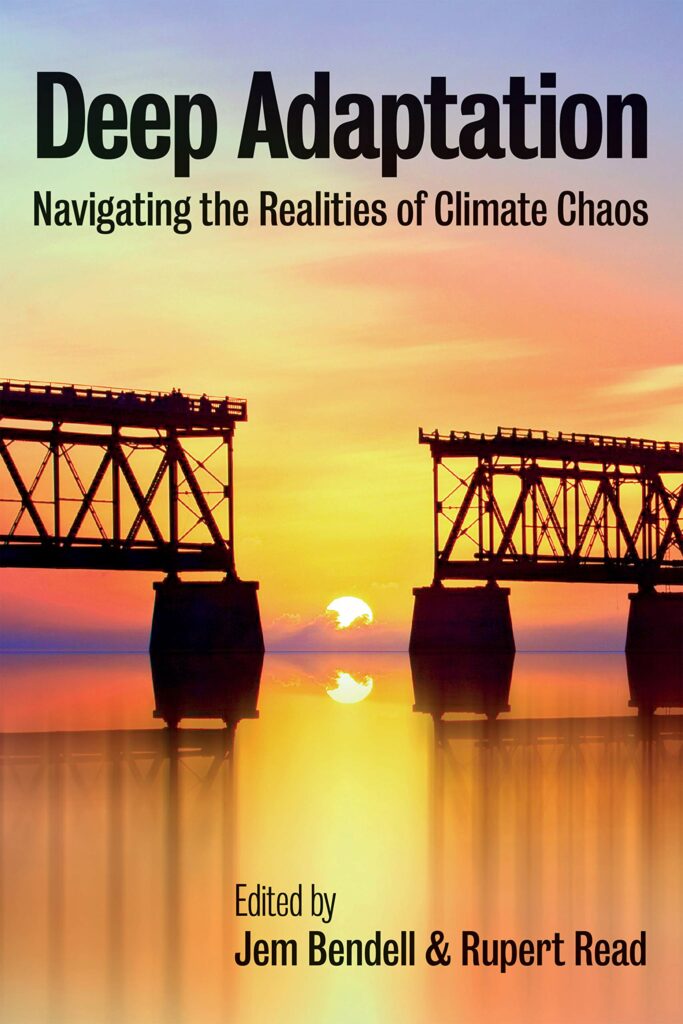I regard Deep Adaptation as one of the most important approaches to the climate crisis, and this new book will give you a thorough grounding in what DA is, and isn’t, and in the various ways it might evolve over the next few years. It’s not easy to define what Deep Adaptation is: I wouldn’t call it a movement, since it is not trying to recruit members or campaign for a specific set of aims. I see DA more as an approach for exploring the climate crisis and related issues, and also as a network offering support and resources: the best gateway is www.deepadaptation.info. The fact that this book is a collection of chapters by different contributors supports this view.
 The book is edited by Jem Bendell, who originated the DA approach back in summer 2018, and Rupert Read, a writer and activist who has been a leading figure in the Green Party and Extinction Rebellion. Unlike many such collections, this one is well-organised, avoids duplicated content, and gives a good overview of the insights, uncertainties, and potential of Deep Adaptation currently.
The book is edited by Jem Bendell, who originated the DA approach back in summer 2018, and Rupert Read, a writer and activist who has been a leading figure in the Green Party and Extinction Rebellion. Unlike many such collections, this one is well-organised, avoids duplicated content, and gives a good overview of the insights, uncertainties, and potential of Deep Adaptation currently.
The content of this book is far too rich to try to summarise in one blog, so I will give a gist of each chapter to offer a flavour.
- This explores what climate science can and cannot tell us about our predicament, written by Jem and Rupert. They observe that, “During times of change, rapid collapse rather than gradual change is quite common for both ecosystems and societies.”
- This is the original paper published by Jem in July 2018, which has now been downloaded a million times. Very clear, and well worth reading.
- One of the most contentious issues in DA is Jem’s view that societal collapse in many countries is inevitable, a claim which he has not really substantiated, and which I, Rupert Read and many others believe is overstated. This chapter is a well-considered exploration of reasons why collapse is quite possible, by four authors including Servigne and Stevens, who have written two very useful books on this topic. For my blog on the first of these, click here. Exploring the risks of collapse and how to prevent it should clearly be a priority, and they explain how the French government is now doing this. They also quote a 2020 opinion survey which found that 56% of people in the UK, 65% in France, think that “western civilisation as we know it will soon collapse”.
- This really useful chapter is by Adrian Tait of the Climate Psychology Alliance. It is a useful and encouraging explanation of the various approaches which the CPA are exploring. I share their view that collective processing and healing of trauma and many other emotions around the climate crisis will be increasingly important, and their Through the Door initiative aims to get therapists and counsellors working with people in nature, which could be another crucial factor.
- This valuable chapter by Jem explores the subconscious beliefs and ideologies which influence many of us, including activists. I have been working with Jem and the DA network since late 2018, and one of the many things I admire about it is a willingness to look at the shadow side, which this chapter does well. Jem looks at a range of beliefs which most white middle-class people hold, such as entitlement, desire for control and autonomy, belief in economic and technical progress. He also offers alternative values, such as compassion, openness and curiosity, mutuality. He highlights the need to become “more aware and less reactive to our emotion of fear”, but also acknowledges how hard it is to see and change one’s own ideology, and he observes that doing so is likely to remain marginal.
- This chapter, entitled Unconscious Addictions, builds on the previous one: it is written by members of a collective called Gesturing Towards Decolonial Futures, who aim to bring in the voice of indigenous and marginalised people. It is a useful exploration of the systemic denials in mainstream society, for example denying that we are “entangled within a living wider metabolism that is bio-intelligent”. They point out that most of us need to wean ourselves off addictions and attachments to ideology and our current sense of self, but the chapter is skimpy on ways to do this.
- This chapter on facilitating Deep Adaptation processes is by Jem with Katie Carr, who has been a key figure in this aspect of DA. If, like me, you are involved in facilitating groups around climate issues, you will find a lot of valuable, practical pointers here. One of the challenges they point out is that “rather than offering a map, DA is more an invitation into maplessness…”, and enabling this requires a facilitator to create a safe and loving containing space. The chapter also lists some specific processes used in the DA Forum, such as Deep listening, Deep relating, and Death cafes.
- This chapter on The Great Turning is by Sean Kelly and Joanna Macy. Joanna is one of the elders in climate responses, having been involved since the 1960s. Her Work that Reconnects is widely used in DA and elsewhere as one of the best ways to enable people to engage with painful feelings around climate, such as fear, overwhelm and grief. It is useful in this chapter to hear how she sees WTR relating to Deep Adaptation and the severe worsening of the climate crisis. For example, they comment that “as collapse intensifies, we can expect … the spread of what Buddhists call the ‘three poisons’: greed, hatred and delusion.” Whilst in the past, the Great Turning might have been seen as moving towards a complete resolution of issues, they accept that this is no longer realistic, and describe it as “not an alternative to collapse, but a passage through.” Their view of this crisis as potentially a “collective initiation” is also a helpful one.
- This chapter by Jonathan Gosling explores leadership and management in the context of DA. He highlights the way that a crisis like this can bring out leadership based on salvation or denial, and he explores what leadership based on adaptation could look like, for example holding “realistic anxiety between panic and denial”, and “sense-giving” in periods of disorientation.
- This chapter by Charlotte von Bülow and Charlotte Simpson explores how education in schools and higher education could align with the DA approach, based on their research with a range of pupils, teachers, parents and others. For example, they explore how the four Rs, a key part of the DA approach, could be embodied within the education system.
- This chapter by Rupert Read explores the future of politics and activism. It is a useful overview of various ways that DA could evolve, including his own variant of it, Transformative Adaptation. He points out that most governments across the world have reacted in a shallow and slow way to the pandemic, and urges activists to focus more on local adaptation, and “community-friendly prepping”, than political change.
- Relocalisation as Deep Adaptation is by Matthew Slater and Skeena Rathor, who is one of the co-founders of Extinction Rebellion. They explore some of the main issues where local initiatives could help, including food, local currencies, and power supplies.
At the end of the book, Jem and Rupert provide a Conclusion, which is in fact appropriately inconclusive. It articulates various ways in which DA could evolve from here, and some of the choices it faces. For example, the pros and cons of trying to share an alarming message much more widely across the population, and whether DA can articulate an image of a ‘better world’, which so many of us need for motivation, given the realities of the outlook. No one could call this an easy or light read, but I urge you to buy the book: you will end up not only better informed, but hopefully better motivated to play a part in the uncertainties ahead.
Teaser photo credit: Photo by Lucas Ludwig on Unsplash





